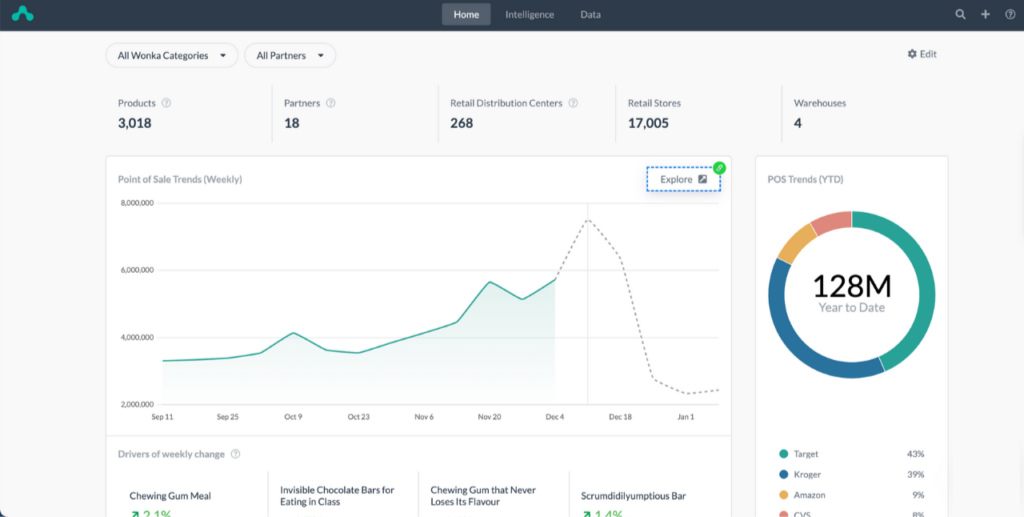See Alloy.ai in Action
Once you submit a demo request form, here’s what comes next:
- A sales rep will email you within 24 hours to schedule a brief intro call.
- Our team will provide an overview of Alloy.ai and learn more about your data goals and objectives.
- Based on what we learn, we’ll create and walk you through a live demo, customized to your specific data needs.

Schedule a Demo
Book a demo today to see how you can connect to 400+ data sources, predict with full visibility into sales and inventory, and respond instantly.
Trusted by 100s of Consumer Brands

Frequently Asked Questions
What data sources can Alloy.ai integrate with?
Alloy.ai integrates with a wide range of data sources, including major retailers and distributors like Target, Home Depot, Amazon, Kroger, and UNFI, to ingest POS, inventory, and order data in near real time. It also connects with internal enterprise systems such as SAP, Oracle, NetSuite, Snowflake, and demand planning tools like o9 and Anaplan to unify supply and demand data. Additionally, Alloy.ai supports syndicated data providers like NielsenIQ, Circana, and SPINS, as well as digital shelf and retail media platforms like Profitero and Stackline. Custom data formats, spreadsheets, APIs, and retailer portals are also supported, offering flexibility across industries and data maturity levels.
Does Alloy.ai support real-time or near-real-time data syncing?
Yes, Alloy.ai supports real-time and near-real-time data syncing. It is designed to automatically ingest and harmonize data from retailers, distributors, and internal systems as frequently as that data is made available—often daily or even multiple times per day. For sources that support it, Alloy.ai uses APIs or webhooks to sync data in near real time, ensuring that brands have up-to-date visibility into sales, inventory, and supply chain performance. This timely data access enables more agile, data-driven decisions across planning, execution, and collaboration with retail partners.
Can Alloy.ai's data platform track sales performance down to the store, item, and day level?
Yes, with Alloy.ai, you can track sales performance down to the store, item, and day level, provided that level of granularity is available from the retailer or distributor. Many major retailers, including Home Depot, Target, CVS, and Walgreens, share daily, store-level, and SKU-level POS data, which Alloy.ai ingests and standardizes across partners. This allows brands to drill into performance by specific product, location, and date to uncover trends, spot out-of-stocks, and optimize supply chain decisions at a highly granular level.
How does Alloy.ai's data platform help CPG companies prevent stockouts or reduce overstock?
Alloy.ai helps CPG companies prevent stockouts and reduce overstock by providing a real-time, unified view of demand and supply across their retail and distribution network. By integrating POS, inventory, and order data from retailers with internal ERP and supply chain systems, Alloy enables teams to detect demand spikes, inventory imbalances, and supply chain disruptions early. The platform’s predictive insights and alerting tools flag at-risk SKUs or locations before issues occur, allowing companies to proactively adjust forecasts, expedite replenishment, or reallocate inventory. This visibility and agility help ensure the right products are in the right place at the right time—reducing lost sales from stockouts and minimizing excess inventory costs.
What does Alloy.ai's new customer implementation timeline and typical onboarding process look like?
Alloy.ai’s new customer implementation typically takes 4 to 8 weeks, depending on data complexity and integration needs. The onboarding process is designed to be fast, collaborative, and low-lift for brand teams. This process generally follows 5 key phases: Discovery & Planning, Data Integration, Configuration & Modeling, Training & Enablement, Go-Live & Optimization. Throughout the process, Alloy.ai handles the heavy lifting, so CPG teams can start seeing insights quickly with minimal IT involvement.
How does Alloy.ai differ from other general BI tools like Tableau or Power BI?
Alloy.ai differs from general BI tools like Tableau or Power BI by being purpose-built for consumer goods brands, with native support for retail, distributor, and supply chain data. Unlike traditional BI tools that require extensive setup, data modeling, and manual dashboard creation, Alloy.ai comes pre-integrated with retailer data feeds (e.g., Home Depot, Lowe’s, Kroger, Target), harmonizes disparate data automatically, and offers out-of-the-box analytics tailored to CPG workflows—such as demand forecasting, out-of-stock detection, and retail performance tracking. It also delivers real-time alerts and proactive insights, reducing the need for users to constantly build and monitor reports. While Tableau and Power BI are flexible, general-purpose tools, Alloy.ai delivers faster time-to-value with a vertical-specific solution that’s ready to drive action in sales, supply chain, and planning functions.
